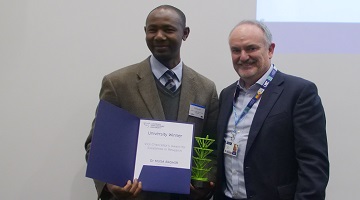2024/25 entry
MEng Civil Engineering
Clearing
Want to study with LJMU this September? Visit our Clearing hub to apply now if you have your grades or register your interest and become a Clearing Insider to receive updates while you wait for your results. Your journey starts with Clearing.
Minimum UCAS points required: TBC
Why study Civil Engineering at Liverpool John Moores University?
- Opportunity to undertake a year's industrial placement
- Part-time option for students already in employment
- 6 million invested in state-of-the-art teaching facilities
- Stepping stone to a varied career with UK and overseas employment opportunities
About your course
The professionally-accredited MEng (Hons) Civil Engineering at Liverpool John Moores University offers you excellent placement options and is the ideal preparation for a varied and interesting career in the world of civil engineering.
If you are interested in creating the structures that support life's basic needs for water, flood control, hospitals, recreation and transport, the Civil Engineering degree at LJMU is a good place to start.
They need to be competent technically, practical in outlook and capable of giving professional advice on a variety of subjects ranging from design to construction and site management.
The degree in Civil Engineering gives you plenty of opportunities to apply your studies to real situations, supported by employers from industry who provide case studies and suggestions for projects and on the year-long work placement should you take this option.
What is an integrated master's (MEng) programme?
The MEng in Civil Engineering is an integrated master's degree. This means that it combines undergraduate and postgraduate study into a single course.
What are the benefits of completing an MEng degree?
- You will graduate with a Master's level degree without having to apply for an MSc course
- You will gain a depth of specialist knowledge and experience highly sought after by employers
- You will enjoy excellent career prospects and expect to command higher salaries than graduates with a BEng
What financial support is available to MEng students?
You will be eligible to apply for the same financial support as other undergraduates for the duration of your MEng. This includes student loans to cover your tuition fees and living expenses plus means-tested grants and bursaries. This financial support is not available to students who enrol on an MSc degree after completing a BEng programme. Furthermore, if you are awarded an LJMU scholarship worth 1,000 or 10,000 you will receive this award for every year of your degree as well.
Why study civil engineering at LJMU?
LJMU's civil engineering programmes are delivered by the School of Civil Engineering and Built Environment, one of the UK's leading research departments for built environment and sustainability research. LJMU is also ranked in the top 15 higher education institutions working in this field. This research directly informs all of LJMU's civil engineering programmes, so you can be confident that your studies will reflect ongoing developments and innovation in this exciting field.
The School's programmes are designed to develop innovative and creative professionals equipped to react to the challenges of the modern global built environment. Staff provide excellent levels of support to ensure you reach your full potential.
Furthermore, extensive links with professional bodies and industry mean you will enjoy a wide range of opportunities for work-placements, professional skills development and networking with potential employers. That's why our students enjoy excellent career prospects after they graduate.
"Many of our civil engineering students obtain employment before the end of their final academic year."
Professional accreditation/links
The accrediting body for this degree is the Joint Board of Moderators for the Institution of Civil Engineers, Institution of Structural Engineers, Institute of Highway Engineers, and the Chartered Institution of Highways and Transportation. Please see www.jbm.org.uk for further information.
This degree is accredited as fully satisfying the educational base for a Chartered Engineer (CEng).
See www.jbm.org.uk for further information.
Ultimately, with relevant work experience and a masters-level degree, the degree can lead to the professional qualification of Chartered Engineer (CEng) and the equivalent European Qualification of EurIng.
This programme is also accredited by IStructE.
Fees and funding
There are many ways to fund study for home and international students
Fees
The fees quoted above cover registration, tuition, supervision, assessment and examinations as well as:
- Library membership with access to printed, multimedia and digital resources
- Access to programme-appropriate software
- Library and student IT support
- Free on-campus wifi via eduroam
Additional costs
Although not all of the following are compulsory/relevant, you should keep in mind the costs of:
- accommodation and living expenditure
- books (should you wish to have your own copies)
- printing, photocopying and stationery
- PC/laptop (should you prefer to purchase your own for independent study and online learning activities)
- mobile phone/tablet (to access online services)
- field trips (travel and activity costs)
- placements (travel expenses and living costs)
- student visas (international students only)
- study abroad opportunities (travel costs, accommodation, visas and immunisations)
- academic conferences (travel costs)
- professional-body membership
- graduation (gown hire etc)
Funding
There are many ways to fund study for home and international students. From loans to International Scholarships and subject-specific funding, you'll find all of the information you need on our specialist funding pages.
Employability
Graduates in Civil Engineering have little difficulty in securing employment; in fact many students receive a number of job offers.
Civil engineers may work on site, or in office-based design work either in civil engineering practices or in local authorities, government agencies or non-governmental organisations. There are good opportunities for work overseas and in the UK on projects such as tall buildings, football stadia, bridges, roads and water treatment works.
If you decide not to pursue a civil engineering career, you will find that the transferable skills gained on the course are highly valued in many other fields of employment.
Student Futures - Careers, Employability and Enterprise Service
A wide range of opportunities and support is available to you, within and beyond your course, to ensure our students experience a transformation in their career trajectory. Every undergraduate curriculum includes Future Focus during Level 4, an e-learning resource and workshop designed to help you to develop your talents, passion and purpose.
Every student has access to Careers Zone 24/7, LJMU's suite of online Apps, resources and jobs board via the LJMU Student Futures website. There are opportunities for flexible, paid and part-time work through Unitemps, LJMU's in-house recruitment service, and we also offer fully funded Discovery Internships.
One-to-one careers and employability advice is available via our campus-based Careers Zones and we offer a year-round programme of events, including themed careers and employability workshops, employer events and recruitment fairs. Our Start-Up Hub can help you to grow your enterprise skills and to research, plan and start your own business or become a freelancer.
A suite of learning experiences, services and opportunities is available to final year students to help ensure you leave with a great onward plan. You can access LJMU's Careers, Employability and Start-up Services after you graduate and return for one-to-one support for life.
Go abroad
LJMU aims to make international opportunities available to every student. You may be able to study abroad as part of your degree at one of our 100+ partner universities across the world. You could also complete a work placement or apply for one of our prestigious worldwide internship programmes. If you wanted to go abroad for a shorter amount of time, you could attend one of our 1-4 week long summer schools.
Our Go Citizen Scheme can help with costs towards volunteering, individual projects or unpaid placements anywhere in the world. With all of these opportunities at your feet, why wouldn’t you take up the chance to go abroad?
Find out more about the opportunities we have available via our Instagram @ljmuglobalopps or email us at: goabroad@ljmu.ac.uk.
A life-changing experience
There's so much more to university than just studying for a degree.
News and views
Browse through the latest stories and updates from the University and beyond
What you will study on this degree
Please see guidance below on core and option modules for further information on what you will study.
Further guidance on modules
Modules are designated core or optional in accordance with professional body requirements, as applicable, and LJMU’s Academic Framework Regulations. Whilst you are required to study core modules, optional modules provide you with an element of choice. Their availability may vary and will be subject to meeting minimum student numbers.
Where changes to modules are necessary these will be communicated as appropriate.
Level 5
Core modules
Materials II
20 credits
This module will help you develop more in-depth and advanced understanding of the main materials that are used in civil engineering. This includes the way some materials develop and gain their properties. You will also explore the effects of using sustainable cement replacement materials and environmentally friendly recycled materials.
Level 6
Core modules
Water Supply and Wastewater Management
20 credits
The module provides a thorough grounding in the design and operation of water and wastewater treatment plants and water supply networks. It ensures the awareness, competencies and methodology for consideration of specific issues in water and wastewater management.
Level 7
Core modules
Civil Engineering Professional Practice
20 credits
This module will help you develop your professional portfolio, within the context of master's level design and evaluative skills development. You will learn to develop systems approach to the solution of complex problems, and evaluate sustainability of designs. You will work from this to further develop your Civil Engineering 'attainments'.
Teaching and work-related learning
Excellent facilities and learning resources
We adopt an active blended learning approach, meaning you will experience a combination of face-to-face and online learning during your time at LJMU. This enables you to experience a rich and diverse learning experience and engage fully with your studies. Our approach ensures that you can easily access support from your personal tutor, either by meeting them on-campus or via a video call to suit your needs.
Teaching on the course is via a combination of lectures, laboratory work, tutorials, workshops, online activities, and practical sessions, combined with your own research using our library and the web. You can expect to spend around nine hours per week in lectures, four in tutorials and up to four in workshops, practical and field-based studies, plus around 23 hours per week in private study.
Work-related Learning
The best way to experience working in the civil engineering industry is to undertake a years (48-week) professional work placement, either in the UK or overseas, so you can put into practice what you have learnt in your first two years. The placement is fully paid and is an invaluable opportunity to learn new skills and gain hands-on experience to add real value to your CV and impress future employers. The direct work experience could also count towards a professional qualification. Taking the sandwich option will greatly improve your career prospects and could even lead to a permanent position with your placement employer.
Support and guidance
Dedicated personal tutor, plus study skills support
Throughout the course you will have the support of a personal tutor who can provide one-to-one guidance and advice on course-related issues. If you decide to take up a third year work placement, there is plenty of support available from the Schools Industry Unit, both in finding and securing the placement, and during the year when one of your tutors will visit you in your workplace to check on your progress.
Assessment
Assessment varies depending on the modules you choose, but will usually include a combination of exams and coursework.
We recognise that all students perform differently depending on the type of assessment they are asked to do, and so a variety of assessment methods are used. These include exams (open and closed book), coursework (projects, technical reports, reviews, etc), and presentations (individual and group). Your tutors will give prompt and constructive feedback via Canvas (our virtual learning environment), face-to-face or in writing. This will help you to identify your strengths as well as the areas where you may need to put in more work.
Course tutors
Our staff are committed to the highest standards of teaching and learning
Facilities
What you can expect from your School
This programme is delivered in the Byrom Street complex of LJMU's City Campus. Here you'll find high quality lecture theatres, meeting and seminar rooms plus social spaces and a large café. The Avril Robarts Library is just minutes away on Tithebarn Street.
The university reserves the right to withdraw or make alterations to a course and facilities if necessary; this may be because such changes are deemed to be beneficial to students, are minor in nature and unlikely to impact negatively upon students or become necessary due to circumstances beyond the control of the university. Where this does happen, the university operates a policy of consultation, advice and support to all enrolled students affected by the proposed change to their course or module.
Further information on the terms and conditions of any offer made, our admissions policy and the complaints and appeals process.










